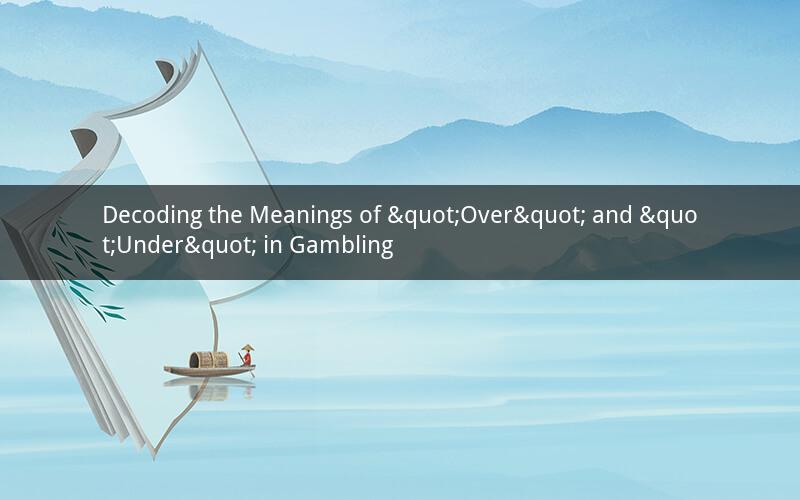
In the world of gambling, understanding the terms "over" and "under" is crucial for both beginners and seasoned players. These terms are commonly used in various gambling games, such as sports betting, poker, and casino games. In this article, we will delve into the meanings of "over" and "under" in gambling, explore their origins, and provide practical examples to enhance your gambling experience.
What does "over" mean in gambling?
The term "over" in gambling refers to a betting option that predicts a total score, number, or outcome that exceeds a specified value. It is commonly used in sports betting, particularly in games like football, basketball, and baseball. In these sports, the "over" betting option is based on the total combined score or points of both teams.
For instance, consider a football game where the total score is set at 40. If you bet on the "over," you are predicting that the combined score of both teams will be higher than 40. Conversely, if you bet on the "under," you are predicting that the combined score will be lower than 40.
How does "over" work in sports betting?
In sports betting, the "over" option is based on a set total, known as the "over/under" line or "total." The bookmaker establishes this line based on their analysis of the game, taking into account factors such as team strengths, player injuries, and historical data.
When placing an "over" bet, you are essentially betting that the total score or points will be higher than the over/under line. If the final score is higher than the line, your bet wins. If the score is lower, your bet loses.
What does "under" mean in gambling?
The term "under" in gambling is the opposite of "over." It refers to a betting option that predicts a total score, number, or outcome that is lower than a specified value. Just like the "over" option, it is commonly used in sports betting, particularly in games like football, basketball, and baseball.
In the same football game example, if you bet on the "under," you are predicting that the combined score of both teams will be lower than 40. If the final score is lower than the over/under line, your bet wins. If the score is higher, your bet loses.
How does "under" work in sports betting?
The "under" option in sports betting works similarly to the "over" option. The bookmaker establishes the over/under line based on their analysis of the game, considering various factors. When placing an "under" bet, you are predicting that the total score or points will be lower than the over/under line.
Is there a difference between "over" and "under" bets?
While both "over" and "under" bets involve predicting the total score or points in a game, there are some differences between the two.
1. Risk and reward: "Over" bets typically offer higher payouts compared to "under" bets, as they are riskier. However, this does not guarantee a win, as the final score can be unpredictable.
2. Market availability: "Over" and "under" bets are available in most sports betting markets. However, some sports may have a higher prevalence of one option over the other.
3. Strategy: Betting on "over" or "under" depends on your analysis of the game. If you believe that both teams will be scoring a lot of points, an "over" bet might be more suitable. Conversely, if you think the game will be low-scoring, an "under" bet might be the better choice.
How can I improve my chances of winning "over" and "under" bets?
To improve your chances of winning "over" and "under" bets, consider the following tips:
1. Conduct thorough research: Analyze team strengths, player injuries, historical data, and other relevant factors before placing your bets.
2. Understand the over/under line: Familiarize yourself with the over/under line set by the bookmaker and consider how it affects your betting strategy.
3. Utilize statistical analysis: Use statistical tools and software to gain insights into the game's potential outcome.
4. Manage your bankroll: Bet responsibly and avoid chasing losses. Set a budget for your bets and stick to it.
5. Stay informed: Keep up with the latest news, player updates, and team performance to make informed decisions.
1. What is the difference between "over" and "under" bets in sports betting?
Answer: The main difference is that "over" bets predict a total score or points that exceed a specified value, while "under" bets predict a total that is lower than the specified value.
2. Can I place both "over" and "under" bets on the same game?
Answer: Yes, you can place both "over" and "under" bets on the same game. This is known as "butterfly betting" and can be a strategic way to hedge your bets.
3. How do bookmakers determine the over/under line?
Answer: Bookmakers determine the over/under line by analyzing various factors, such as team strengths, player injuries, and historical data.
4. Are "over" and "under" bets available in all sports betting markets?
Answer: Yes, "over" and "under" bets are available in most sports betting markets, particularly in games like football, basketball, and baseball.
5. What is the best strategy for placing "over" and "under" bets?
Answer: The best strategy is to conduct thorough research, understand the over/under line, utilize statistical analysis, manage your bankroll responsibly, and stay informed about the latest news and team performance.